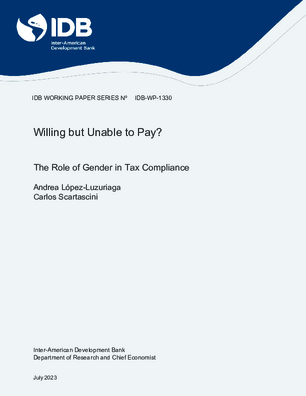Willing but Unable to Pay?: The Role of Gender in Tax Compliance
Date issued
Jul 2023
Subject
Taxation;
Tax Compliance;
Women;
Gender;
Taxpayer;
Property Tax;
Liquidity
JEL code
H24 - Personal Income and Other Nonbusiness Taxes and Subsidies;
D31 - Personal Income, Wealth, and Their Distributions;
J16 - Economics of Gender • Non-labor Discrimination
Country
Argentina
Category
Working Papers
The existing literature shows that women are more likely to pay taxes than men. Yet, there is less consensus on the gendered responses to interventions aimed at boosting tax compliance among non-payers. In this study, we exploit a field experiment designed to increase property tax compliance to investigate this gender disparity. Our findings reaffirm that women are typically more diligent in paying their taxes than men. Interestingly, while the receipt of a deterrence letter prompts women to pay earlier, it does not necessarily augment their overall compliance. Conversely, men, upon receiving a deterrence letter, show a marked improvement in overall compliance. We also find that the size of the tax bill influences women's compliance behavior (the likelihood of paying'increases substantially for small bills), but not men's. To unpack this intriguing finding, we examine survey data to uncover the differing motivations and resources between
genders. This analysis suggests that, although women may be more motivated to pay, they might encounter significant liquidity constraints. Our observations are consistent with a simple analytical model that correlates compliance to tax morale, risk aversion, and budget constraints. This research underscores the potential for tax policies and enforcement procedures to exacerbate income inequality between genders, especially in low tax-enforcement contexts where tax evasion is substantial.
genders. This analysis suggests that, although women may be more motivated to pay, they might encounter significant liquidity constraints. Our observations are consistent with a simple analytical model that correlates compliance to tax morale, risk aversion, and budget constraints. This research underscores the potential for tax policies and enforcement procedures to exacerbate income inequality between genders, especially in low tax-enforcement contexts where tax evasion is substantial.
Generative AI enabled




